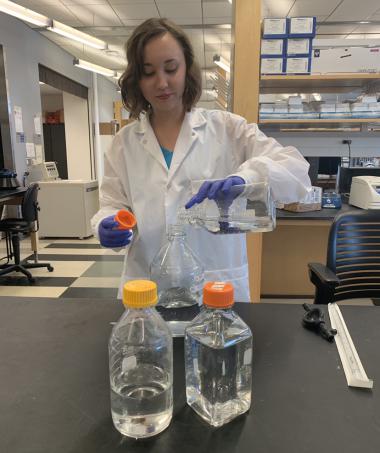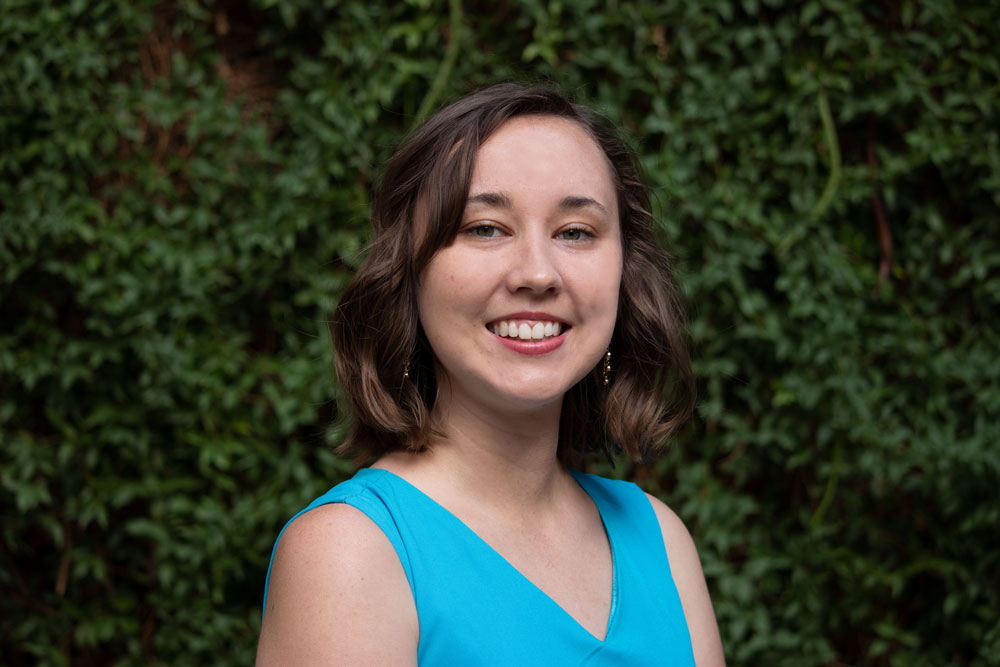Growing and learning all about soil microbes
“Joy has consistently grown in her abilities as a scientist and her finished thesis is an excellent example. Moreover, she completed the final experiments and the thesis itself while successfully juggling coursework, teaching assistant duties, COVID-19 related transitions.”
-
- Dr. Paul Carini, nominator and faculty adviser
Tell us a little about yourself.
I was born in California, but my family moved to the Phoenix area when I was in third grade, and like to read, swim, and volunteer in my free time.
Since I was young, I was always interested in endangered animals. Every month, I had a new obsession: polar bears, elephants, manatees, etc. As I got older, I learned more about the environmental issues threatening the habitats and survival of these species.
I wanted to know how I could combat these environmental issues to create a more sustainable, thriving world for these species and humanity. So, my childhood interest segued nicely into an environmental science major, as I started to learn more about species invisible to the naked eye: microbes.
What is your research and what are the broader impacts?
Joy Custer_lab_work.jpeg

I participated in the Accelerated Master’s program in Environmental Science, graduating with my Bachelor’s in 2019 and then my Master’s in 2020.
I research soil microbes and their roles in shallow subsurface soil environments. Soil microbes are essential to the health and vitality of soil environments as well as the planet as a whole. These organisms contribute to climate change resilience, biogeochemical cycling, and plant health.
However, because of the low cultivation numbers of soil microbes under standard laboratory conditions, many of the functions and actions of these microbes in the environment are unknown to scientists. There are more microbes in one gram of soil than there are people in the entire world; however, only 1% of these microbes have been successfully cultivated in a lab.
For my thesis, I optimized methods to increase the success of cell separation protocols and subsequent cultivation.
Key Takeaways
- Nutrient concentration in growth medium influences the culturability of common soil microbes.
- There are microbes located throughout the Nycodenz buoyant density separation after centrifugation.
By knowing that nutrient concentration impacts the culturability of soil microbes, scientists can begin to narrow down the cultivation requirements needed for these microbes to be grown in a lab environment. Additionally, scientists can understand soil microbial diversity, link function to structure of microbial communities, and potentially engineer soils to mitigate against climate change.
What did you enjoy most about graduate school and your research?
I appreciated independently working on my research, troubleshooting issues for myself. Given a goal, I figured out steps reach that goal on my own. Now that I am in the real world, I realize it is rare to drive my own work with minimal oversight.
I really appreciate that my advisor, Dr. Paul Carini, trusted me to complete my research effectively and believed that I would be successful on my own. Having such a supportive mentor definitely made my life much easier!
Future plans?
I am currently serving as an AmeriCorps VISTA member and Youth Engagement Coordinator at the Orchard Learning Community Center in South Phoenix.
After this one-year program, I hope to transition the skills I learn into a position at a nonprofit that focuses on environmental advocacy, education, and community outreach. I want to teach the general public in my community about environmental issues and how we can combat them.
By providing knowledge and resources to others, we can encourage meaningful changes in the way we live our lives and hold others accountable for their impacts on the environment.
Words of advice?
No matter how extensively you plan, they can be irrelevant at a moment’s notice. Learn to adapt easily and positively (for example, if there’s a worldwide pandemic). And don’t stretch yourself too thin, learn to say no.


